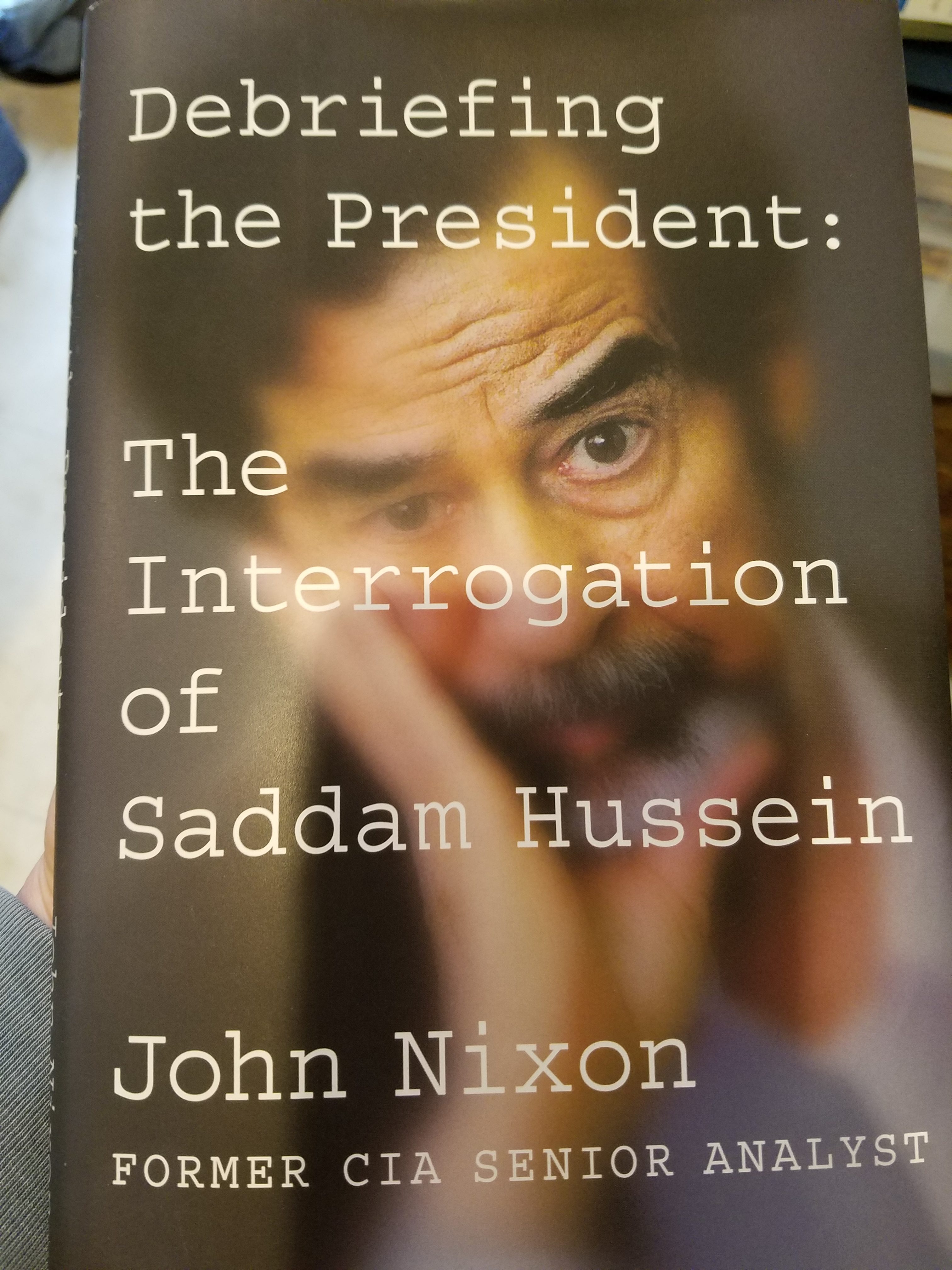
Reading Debriefing the President: The Interrogation of Saddam Hussein was not a difficult task. In fact, it was an easy read, surprisingly pleasurable considering the subject matter.
Though I would not call myself an expert, I am very knowledgeable about Iraq. My husband is from Iraq so my curiosity and desire to know everything I could about the subject has been my mission since our marriage almost eighteen years ago.
John Nixon did an excellent job of correcting a lot of misinformation about Iraq and Saddam that, unfortunately, become ‘common knowledge’ – especially during the buildup to the U.S. invasion of Iraq.
My husband lived in Iraq until just after the first invasion and most of his immediate family remained in Iraq until just before the second invasion. Much of his extended family remains there today and a few members of his immediate family have continued to operate businesses in Iraq, requiring they travel there somewhat regularly.
As a result, I have always had access to personal perspectives ‘on the ground’ as well as perusing the multitude of books and articles written about Iraq.
Mr. Nixon, in my opinion, was fair in describing not only the errors made over the years by U.S. government officials and the intelligence community but also an extremely rare depiction of Saddam. A lot of misunderstandings, intentional and unintentional, existed between the U.S. and Iraq.
Mr. Nixon did make two major errors. Considering his expertise, I was not just disappointed but a bit shocked by them. I have to wonder if the mistakes were deliberate or simply a parroting of the current political framing – which I would find highly surprising in light of his biggest complaint being erroneous political rhetoric framing.
Though Mr. Nixon mentioned the mistakes a couple of times in his book, I felt this paragraph most demonstrates the errors:
…Wahhabis or Salafis, Sunni Muslims who strictly adhere to the teachings of Muhammad in the Koran and the Hadith, a collection of Muhammad’s utterances recorded by one of his companions.
First, Wahhabis and Salafis, though Sunni Muslims, do not strictly adhere to the teachings of Muhammad in the Koran and the Hadith. Wahhabis and Salafis adhere to a strict interpretation of the Koran and the Hadith.
That is a major and distinct difference.
Much of what the Wahhabis and Salafis promote as required within Islam is not demonstrated explicitly in the Koran or Hadith. Some are even in direct conflict with the Koran and Hadith – particularly with the last speech of the Prophet.
Millions of Muslims all around the world would consider themselves strict adherents of the teachings of Muhammad in the Koran and the Hadith but in complete opposition with the Wahhabis and Salafis interpretations.
Second, Hadith is not a collection of Muhammad’s utterances recorded by one of his companions.
Hadith is a collection of traditions containing sayings of the prophet Muhammad that, with accounts of his daily practice (the Sunna), constitute the major source of guidance for Muslims apart from the Koran.
Both the sayings and daily practices were reported by a large number of companions and followers and were also recorded by more than one companion. After vigorous investigation and tracing to the original source, Hadith were given ‘strength’ rankings that resulted in some Hadith being more credible than others.
As noted by Mr. Nixon, Saddam was adamantly opposed to mixing religion and politics – and even more opposed to the practice and spread of Wahhabis and Salafis teachings in Iraq. Saddam saw Wahhabis and Salafis teachings as a threat not only to Iraq but to Islam itself.
One of the few astounding facts Mr. Nixon brought to my attention was the use of tattoos as identification in Iraq. I had never heard of this and the vast majority of Muslim scholars in the U.S. state point blank that tattoos are forbidden by Islamic law.
Mr. Nixon described two tribal tattoos used to identify Saddam. I asked my husband about it and he told me that every generation prior to his own, from his father back, had tribal identification tattoos… that tattoos were common in the history of Iraq as identification prior to the creation of identification papers.
Mindblown.
I knew that several cultures, including Muslim-majority cultures, had tattoos – which always made me question the common U.S. Muslim interpretation that tattoos are forbidden. Now I find that tattoos were even more prevalent among Muslims… solidifying my opinion that the ruling on tattoos is a totally new development within Islamic teachings.
Not that I have a tattoo or ever plan to get one. However, I never take religious ‘rules’ at face value and always research them further.
Other than these two errors, I found the book extremely interesting and, in discussing the book with my husband, found very little fault in the sequence of events and facts presented by Mr. Nixon.
The book flowed well, was easy to follow, had a good overview of necessary background information, and would be interesting even to those unfamiliar with the subject before.
I not only would recommend this book but have already recommended this book to several people are very familiar with the subject.